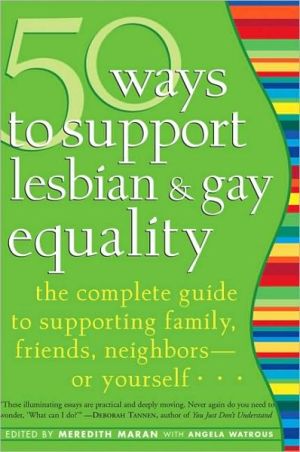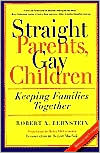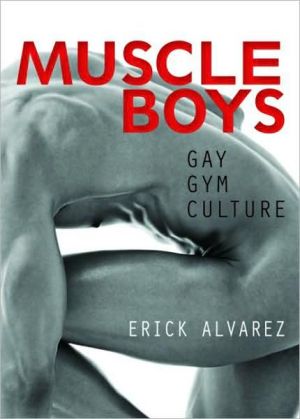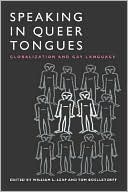50 Ways to Support Lesbian and Gay Equality: The Complete Guide to Supporting Family, Friends, Neighbors--or Yourself
Homosexuality has been politicized, but all that controversy fades in the face of a real, live person who deserves basic human rights and freedoms. A timely and crucial guide for action, 50 Ways to Support Lesbian & Gay Equality offers informative and poignant essays that will deepen understanding while suggesting simple things you can do to achieve equality.
Search in google:
Homosexuality has been politicized. But when the issue hits home, whether it involves a family member, colleague, or neighbor who's gay, all that controversy fades in the face of a real, live person who wants and deserves basic human rights and freedoms. Written by gay, lesbian, bisexual, and transgendered people and those who care about them, 50 Ways to Support Lesbian and Gay Equality is a compendium of informative, joyful, and poignant essays by well-known experts, activists, and leaders, each promoting understanding while suggesting simple actions. From defining terminology ("What's gay baiting?"), to exploring family issues ("How can I support a lesbian couple who want to have children?"), the book deftly navigates workplace, cultural, and political issues. This timely and much-needed guide demonstrates positive ways to deal with everyday homophobia and heterosexism, or just plain uncertainty at the unfamiliar, offering guidance on issues ranging from the personal — what to say to a closeted friend — to the political — how to support gay rights around the world. Library Journal Advocacy seems to be the buzzword of the gay rights movement today, and one sign is the plethora of books aimed at the sympathetic heterosexual audience. Ayres (law, Yale Law Sch.) and Brown (law, Quinnipiac Univ. Sch. of Law) approach the subject of advocacy in the book's first half by positing the notion of heterosexual privilege and its concomitant responsibility to make society more inclusive to its gay citizens. That privilege, they argue, should be used to further a broad-based program of legislative and legal change in education, the workplace, and civic organizations. Additionally, the authors provide "concrete steps to take at home" and print and Internet resources for further study. The second half moves into more conceptual waters, promoting the notion of "ambiguation" whereby heterosexual supporters of gay rights make their own sexual orientation more publicly ambiguous (e.g., by using gender-neutral speech) in the hope of fighting stereotypes and encouraging positive change. Finally, the authors lay out a theoretically elegant (if realistically problematic) incremental and voluntary approach to open up the U.S. military to gays and lesbians. 50 Ways takes a much more personal look at heterosexual advocacy for gay rights in the form of short personal essays by a variety of gay rights advocates that includes celebrities, writers, and artists. These clear-cut essays ask readers to do the simple things: read a gay book, mentor a gay teen, and choose words with care. Among the contributors are Ben and Jerry's cofounder Jerry Greenfield, who discusses ways to create a gay-friendly workplace; author and award-winning high school soccer coach Dan Woog (School's Out), who urges gays and straights alike to come out of the "locker room closet"; and comedian Margaret Cho, who urges supporters to "grab the brass ring of equality" by standing up to the "silent complicity of the status quo." Larger public libraries may opt for both titles given their different approaches, while smaller libraries may find 50 Ways preferable for its more personal take.-Jeff Ingram, Newport P.L., OR Copyright 2005 Reed Business Information.
Introduction1Come out, come out wherever you are7Teach your loved ones to love you or lose you9Love your LGBT family and friends11Value families like mine14Come together across lines of difference17Cherish the diversity of the human family20Name the one you love25Take on the pronoun challenge (but don't lose sleep over it)27Talk to children about LGBT people : it's elementary29Learn a new language32Choose your words with Cuidado34Acknowledge heterosexism39Overcome everyday homophobia42Dismantle stereotypes and misconceptions45Watch movies about LGBT life48Take a lesson from history51Study something queer54Walk a mile in my heels56Learn the facts about lesbian and gay families61Put the "I" in pride64Join the village67Make it better for the next generation70Support LGBT youth73Speak of sexuality79Stay the course on marriage81Protect queer reproductive rights84Gain legal protection for gay families86Support parental rights for both parents89Abolish anti-gay adoption laws92Fight for workplace protections95Address transgender rights98Demand immigration equality101Ask, tell104Engage in the politics of equality107Stop hate before it kills111Unite against violence113Demand equality in health care115Stay Sane in a crazy world117Take the blame out of AIDS120Advocate for our elders122Keep the faith124Make the world safe for LGBT people126Liberate yourself from labels : bisexuality and beyond131Fuel your activism with pride133Get the scoop on creating a gay-friendly workplace135Keep a queer eye on the media137Come out of the locker room closet139Create the space to be out while about141Leverage your spending power143Grab the brass ring of equality145
\ From Barnes & NobleThanks to issues like same-sex marriage, homosexuality is a hot political topic. But beneath the headlines and the volatile public debates are real people dealing with real needs, rights, and aspirations. This empowering compendium lives up to its extended title. Combining personal stories with practical guidelines, 50 Ways to Support Lesbian and Gay Equality offers positive solutions to everyday incidents of homophobia and heterosexism, and explores workplace, family, cultural, and human rights issues. The contributors include Candace Gingrich, Margaret Cho, Judy Shepard, Rebecca Walker, and leaders of organizations including the ACLU, Amnesty International USA, GLAAD, Human Rights Campaign, and PFLAG.\ \ \ \ \ Library JournalAdvocacy seems to be the buzzword of the gay rights movement today, and one sign is the plethora of books aimed at the sympathetic heterosexual audience. Ayres (law, Yale Law Sch.) and Brown (law, Quinnipiac Univ. Sch. of Law) approach the subject of advocacy in the book's first half by positing the notion of heterosexual privilege and its concomitant responsibility to make society more inclusive to its gay citizens. That privilege, they argue, should be used to further a broad-based program of legislative and legal change in education, the workplace, and civic organizations. Additionally, the authors provide "concrete steps to take at home" and print and Internet resources for further study. The second half moves into more conceptual waters, promoting the notion of "ambiguation" whereby heterosexual supporters of gay rights make their own sexual orientation more publicly ambiguous (e.g., by using gender-neutral speech) in the hope of fighting stereotypes and encouraging positive change. Finally, the authors lay out a theoretically elegant (if realistically problematic) incremental and voluntary approach to open up the U.S. military to gays and lesbians. 50 Ways takes a much more personal look at heterosexual advocacy for gay rights in the form of short personal essays by a variety of gay rights advocates that includes celebrities, writers, and artists. These clear-cut essays ask readers to do the simple things: read a gay book, mentor a gay teen, and choose words with care. Among the contributors are Ben and Jerry's cofounder Jerry Greenfield, who discusses ways to create a gay-friendly workplace; author and award-winning high school soccer coach Dan Woog (School's Out), who urges gays and straights alike to come out of the "locker room closet"; and comedian Margaret Cho, who urges supporters to "grab the brass ring of equality" by standing up to the "silent complicity of the status quo." Larger public libraries may opt for both titles given their different approaches, while smaller libraries may find 50 Ways preferable for its more personal take.-Jeff Ingram, Newport P.L., OR Copyright 2005 Reed Business Information.\ \








